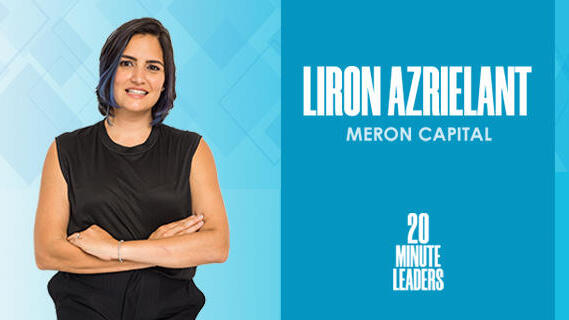
20-Minute Leaders
“Continuous resiliency brings tremendous value. This is what we strive to bring.”
Rather than focusing on a specific part of the tech world to invest in, Meron Capital looks for founders who are strong and resilient, says Liron Azrielant, founder and managing partner
Rather than focusing on a specific part of the tech world to invest in, Meron Capital looks for founders who are strong and resilient, says Liron Azrielant, founder and managing partner. To find those teams, she aims to work with entrepreneurs before they even realize they have a fundable idea. By building a relationship early, she explains that the founders see Meron’s value and she gets to see how they respond to feedback. When starting her own firm, she shares that she was surprised at how much investors needed to be seen as valuable and wanted by the right founders, but she caught on quickly. Azrielant says she has always been good at getting accepted to top programs, but she is proud of her work at Meron that is dependent on results. She had a tendency toward tech, but also in the theoretical, which led her to becoming an investor.
Click Here For More 20MinuteLeaders
If you look back, what are some of the big milestones of your journey that made you who you are today?
Allow me to kind of divide my story into two parts. So Talpiot, MIT, Agilent Technologies—the path that I took until I was 28 or so—has a lot to do with getting accepted to places. I'm pretty good at getting accepted to places. It's about storytelling, it's about positioning, it's about marketing. It's about understanding where you're getting, what they're looking for, what you have, and bridging them. That's a great skill, but it's not very operational. I think it really helps to be in a lot of these top places.
But if you ask me what I'm the most proud of, it's absolutely founding and building Meron Capital, because this has nothing to do with getting the approval of someone standing at the door saying you get in, you don't. This only has to do with results and how much money I'm bringing my investors. Of course, you need to sell your investors, so being really good at positioning and selling helps. But unless you bring money over money, this is all meaningless. You get measured at the result. Meron Capitol is the part of my resume that I'm most proud of.
But of course, once you're in those places, it's incredibly intense. I do think that it says a lot about a person who goes through their stages and consistently performs at the highest degree. Then you transitioned to Blumberg Capital as an investor. Was this the whole plan, to become an investor and create your own fund?
No. I think I always kind of wanted to be a CTO, a technology leader, and a founder. I'm not as good technically as I've always thought of myself. I'm a mathematician, if anything. I'm very theoretical. I can do pseudocode on a napkin. The degree at MIT was an attempt to try and learn to be more technical, but then I just kind of naturally drifted through the theoretical.
I think becoming an investor had to do with my natural tendency towards tech, but also my natural tendency to go abstract, to go theoretical, to understand the moving parts behind things and not into the details.
What is sort of the north star of Meron Capital? What is Meron Capital for you?
One of the shocks that I got when I started Meron Capital—I was moving from being a principal at Blumberg Capital, and I wasn't the decision maker. When founders decided not to go with us, I wasn't even always the one receiving the news. I wasn't even that much aware of the level an investor needs to sell himself and how much it's about being wanted, being (seen as) valuable by the right founders and right people, and not necessarily about making the right choice. My partner and I learned that pretty fast.
Let's say you meet a founder that you really want to invest in, and obviously you have others that want to invest in them too: what happens now?
Hopefully, that doesn't happen. Hopefully, I meet a very strong developer who is considering becoming a founder, considering starting a company. I meet with him or her every few weeks, we ideate together, I connect them to other founders. Hopefully, before they even realize they become fundable, I realized that.
Our best deals are ones that we help grow. That's for two reasons. One is because these are the founders that understand our value the most. They kind of have a chance to test drive us as investors. The second thing is that I absolutely hate the 24-hour term sheet. I've seen some funds pride themselves on it: "We can give a founder a term sheet in 24 hours." That's a shotgun marriage.
Yes, it's eloping. I just love your model of going back and saying, "Wait, we're playing a different game. We actually understand that the real due diligence here is not just on the founders and the problem, but it's also on our relationship. We've already invested our time. The money is just accompanying the fact that we are solidifying this engagement through sort of a marriage.” Right?
Right. With the 24-, 48-, or 72-hour term sheets, investors have no idea how the people they invest in respond to feedback because there wasn't any feedback. We know this because they mostly came to us with a pretty bad idea or an idea that wasn't fundable at that moment. But we saw something in the team, in the potential, and that's more important. The industry is so crazy right now that sometimes while we do this process, before we're willing to say, "Okay, they've hit something," other funds swoop in and take the deal. And that's totally fine.
We're like diamond pickers. We're the spear hunters, we're not fishing with a net. The conversion rate from meeting with the founder regularly is high enough that it's scalable for us. We only need three, max four deals per partner per year. Those were our best deals. That's something we really, really like doing. In a lot of ways, that's our differentiator.
We sometimes do deals that have the normal process. Those are a little bit more deals where we feel we see something that the others don't. We feel like there might be some reason to not do the deal, but we feel like we see past it, and those deals we love as well.
If you're now looking at Meron Capital in the tech sector, what is the thesis?
That comes back more closely to the last question than you think. The team is a lot more important. The deals that we identify as deals tend to be more important than thesis-driven or betting on the right market. Our thesis is "Strong, resilient founders operating in growing markets with good dynamics." We're open to having a founder convince us that a market that we see as difficult or not great actually has enough merit to warrant his time spent there.
What is your preferred engagement style with the companies that you invest in?
In this structure, we're the trusted party. My best relationships with founders are those that they'd call me and say, "Hey, this and this is happening. How would you react to this? I need some advice." Remembering that we're on the same side and realizing that most businesses fail because of notwithstanding the heat rather than maybe not making the most accurate decision. Having us care for the founder, it's like continuous resiliency. Because it's a marathon, you need to stay strong. It is something that brings tremendous value. This is what we strive to bring.
Michael Matias, Forbes 30 Under 30, is the author of Age is Only an Int: Lessons I Learned as a Young Entrepreneur. He studies Artificial Intelligence at Stanford University, is a Venture Partner at J-Ventures and was an engineer at Hippo Insurance. Matias previously served as an officer in the 8200 unit. 20MinuteLeaders is a tech entrepreneurship interview series featuring one-on-one interviews with fascinating founders, innovators and thought leaders sharing their journeys and experiences.
Contributing editors: Michael Matias, Megan Ryan
